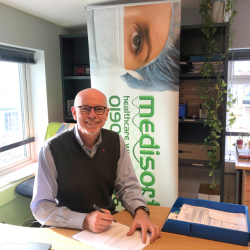Tell us about Medisort and its services.

Medisort is a healthcare waste collection company. We specialise in looking after anybody that provides healthcare services to humans or animals. Customers range from acute hospitals to independent chiropodists, podiatrists or even tattoo parlours, beauty parlours, funeral directors, vets, equine centres – we’ll go and help them deal with their waste. As well as Sussex, we operate in Kent, London, Essex, Bedfordshire, Berkshire right across to East Dorset – including all of Hampshire.
How has the business evolved since launching in 2009?
I started the company in a van by myself, driving around picking up waste. The opportunity came to purchase a site that was already operating as a clinical waste treatment facility and that gave me the opportunity to step it up. We invested in new equipment to sterilise the waste here the following year and the business is progressively changing.
Tell us about your future plans for the company.
My ambition is that we transition to being a materials recycling company, or better still a materials recovery or remanufacturing company – we’re looking at all sorts of initiatives.
For example, we’ve been sterilising single-use instruments such as scalpels, scissors and lots of gynaecological tools that are made out of steel – which currently can only be used once before having to be disposed of – and then making them available to go back into the recycled metal market. Ordinarily, the industry standard method is to send them off for clinical waste incineration and they end up as part of the ash. Sometimes they go into road making and things like that, but generally not a lot of useful stuff.
Another thing we do is take out silver salt that was used in old fashioned X-ray machines. There are still a few around, and again it’s a better way of disposing of that material because the silver nitrate that comes out can then be used to make fresh silver.
We’re working with Inpress in Littlehampton to come up with a method of reusing sharps containers too, which is exciting.
Tell us about your project with the University of Brighton to recycle nappies and sanitary products.
At the moment, 800,000 tonnes of soiled nappies are disposed of every year in England and Wales. It’s an awful lot of material and it all goes either to landfill or up in smoke. We’re working with an Australian partner to try and find a method to turn that waste product into an absorbent pellet that might be used for pet litter or animal bedding or oil absorbent granules, or something of that nature. It’s a long process, however.
We signed a Knowledge Transfer partnership with the University of Brighton and Innovate UK back in 2018. Sometimes the results of that research work and collaboration with the university doesn’t necessarily result in a technological breakthrough straight away, but it gives you access to other conversations you might not otherwise have had or been able to join, because it adds to credibility. They’ve got some extremely bright people and some great facilities available to use as well.
Tell us about your approach to sustainability. What is Medisort doing to reduce its impact on the environment and its carbon footprint?
When the pandemic struck, we brought the sales team indoors so they’re ringing people instead of being out in cars burning fuel.
When I first started the business, we used to have a triplicate pad of carbon copy sheets that people hand-wrote for our waste transfer notes – that process now is now electronic.
We’ve also installed solar panels – we’ve got two 30 kilowatt solar arrays on our roof, organised by the Brighton Energy Coop. It’s a good scheme – we didn’t have to come up with the capital up front. We negotiated a price on the electricity that we generate on our roof, which we rent to them. That kind of symbiotic relationship has resulted in us having a reduced cost as well as a significantly reduced environmental impact.
Like many businesses, we’ve put LED lighting in when old fashioned light bulbs have failed. We’ve also put better mechanisms on our electric motors so that they start and stop more efficiently.
We’ve been involved with the Green Growth Platform at the University of Brighton on a net zero training programme, which was coupled with basic mathematics training for people as well.
Is there a greater appetite now to reduce waste? Are businesses/public sector organisations taking meaningful action to bring in greener practises?
I’d say it’s split. Our biggest customer is the government as the NHS provides most of the work we deal with. The NHS has a target to get to net zero and every player within the marketplace is expected to assist them in achieving that. That applies to both their own waste managers on the facilities and suppliers like us to help them achieve that goal.
We have commercial customers too and their motives are slightly different because they have a profit motive. They are less driven by evidence of sustainability initiatives and more driven by price.
However, some of the tender processes we engage with on the NHS are still quite heavily influenced by price. There’s a challenge there regarding the verification of sustainability claims. I think the government needs to consider the methods they adopt to verify claims suppliers make, particularly regarding sustainability. It can determine who is awarded the contract – but if they’re unable to deliver on their carbon savings claims, what are the consequences? In fact, there aren’t any. If somebody says they’re going to save 75% of their CO2 emissions and they don’t, this doesn’t generally result in that person losing the contract.
Something like B-Corp and the awarding of those certificates has a high level of credibility. That’s the sort of thing we should be encouraging government to formally adopt.
What do you think are the biggest challenges for businesses in Coastal West Sussex?
The big problem for us here is access and the road network – the railway and all the level crossings that make moving in and out slow, inefficient and environmentally awful.
Another thing that may not come up so often is the gas network. Of course, we don’t want to encourage people to burn more gas, but for example, we raise steam by burning oil here because the gas pipe in the road isn’t big enough to supply our boiler to raise the steam to sterilise the waste. It’s not the sort of thing that crops up in every industry, but that’s restricting our ability to emit lower emissions, even with existing technology.
What are your hopes and aspirations for the region?
There’s a lot of investment going on – a lot of new houses being built and the road infrastructure is being worked on – I hope it carries on in that way and continues to get better.


Recent Comments